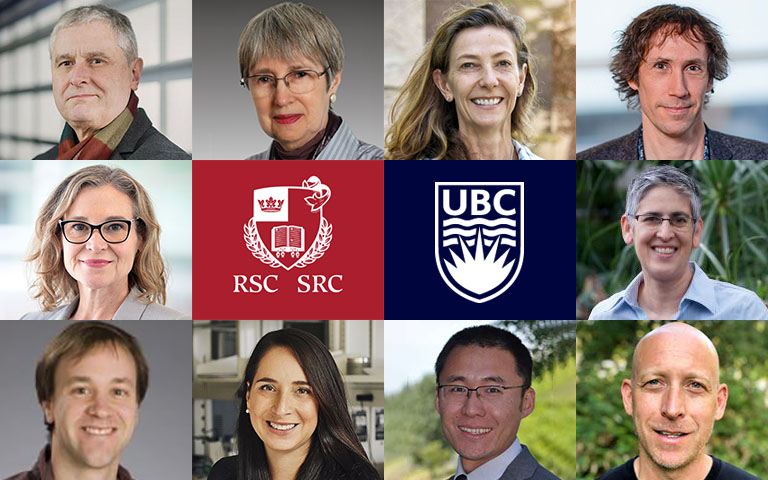
September 5, 2023
A total of ten UBC faculty members have been announced by the Royal Society of Canada (RSC) as new Fellows and as new Members of the RSC College of New Scholars, Artists and Scientists.
Seven UBC faculty members have been named Fellows of the Royal Society of Canada. Fellows are elected by their peers for their outstanding scholarly, scientific and artistic achievement. They are distinguished individuals from all branches of learning who have made remarkable contributions in the arts, the humanities and the sciences, as well as in Canadian public life.
Three UBC faculty members were named as Members of the College of New Scholars, Artists and Scientists. The RSC College is Canada’s first national system of multidisciplinary recognition for the emerging generation of Canadian intellectual leadership.
The 2023 Fellows and Members will be welcomed into the RSC in November, at the RSC Celebration of Excellence and Engagement.
Citations courtesy of the Royal Society of Canada
NEW FELLOWS
Prof. Timothy Cheek (Department of History / School for Public Policy and Global Affairs, UBCV)
Historian Timothy Cheek commands international attention for his field-changing research into modern Chinese intellectuals and the Chinese Communist Party. His global stature attests to first-rate scholarship characterized by a singular ability to make connections across disciplines and continents. Cheek’s prodigious research, manifest in works like The Intellectual in Modern Chinese History, has bridged China’s past and present, international scholarly communities, and the spheres of academia and public policy.
Prof. Leah Edelstein-Keshet (Department of Mathematics, UBCV)
A leading researcher in Mathematical Biology, Leah Edelstein-Keshet served as the first woman president of its learned society (SMB). Her book (in the Society for Industrial and Applied Mathematics “Classic” series) is a favorite in the field, enjoyed by thousands of aspiring students. She uses mathematical models to probe the biological mysteries of how living cells polarize, migrate, interact, and self-organize collectively.
Prof. Catherine L. Johnson (Department of Earth, Ocean and Atmospheric Sciences, UBCV)
Catherine Johnson is a global leader in studies of terrestrial and planetary magnetism. Catherine’s work addresses fundamental questions related to how terrestrial planets and moons form and how their interiors function. Through key roles on science teams for NASA missions, she has pioneered studies of interactions among planetary magnetic fields, deep interior processes and the solar wind. Catherine is a Fellow of the American Geophysical Union and a member of the American Academy of Arts and Sciences and the National Academy of Sciences.
Prof. Kevin Leyton-Brown (Department of Computer Science, UBCV)
Kevin Leyton-Brown is a professor of Computer Science and a Distinguished University Scholar at the University of British Columbia, a Canada CIFAR AI Chair at the Alberta Machine Intelligence Institute and an associate member of the Vancouver School of Economics. He received his PhD and M.Sc. from Stanford University (2003; 2001) and B.Sc. from McMaster University (1998). He studies artificial intelligence, mostly at the intersection of machine learning and (1) the design and operation of electronic markets and (2) the design of heuristic algorithms.
Prof. Kathleen Martin Ginis (School of Health and Exercise Sciences, UBCO / Department of Medicine)
Kathleen Martin Ginis is the international authority on physical activity behaviour-change interventions and psychosocial outcomes in people with disabilities. Her innovations in theory, measurement, intervention design and knowledge-translation are used worldwide. She has led international teams that have developed, tested, published and implemented hundreds of evidence-based tools and programs, while advancing scientific rigour and understanding of physical activity behaviour among people with disabilities.
Prof. Diane S. Srivastava (Department of Zoology, UBCV)
Diane S. Srivastava is an internationally-recognized authority in community ecology. Her groundbreaking research integrates spatial and trophic processes to understand food webs, and their response to global change. She pioneered the use of natural microecosystems for testing the universality of ecological processes, and has authored seminal ecological syntheses. Her leadership nationally has led to a revitalization of synthesis science in Canada’s ecology and evolution research community.
Prof. Mark van Raamsdonk (Department of Physics and Astronomy, UBCV )
Professor Mark van Raamsdonk has made ground breaking contributions to theoretical physics, in particular quantum field theory, string theory, and quantum information. One of his most profound results is the demonstration that spacetime in gravity and thus Einstein’s equations of General Relativity can emerge from quantum entanglement. His work contributed seminally to our modern understanding of the relation between quantum mechanics and gravity.
NEW MEMBERS OF THE RSC COLLEGE OF NEW SCHOLARS, ARTISTS AND SCIENTISTS
Prof. Emily D. Cranston (Departments of Wood Science / Chemical and Biological Engineering, UBCV)
Emily D. Cranston is a Professor and President’s Excellence Chair in Forest Bioproducts at the University of British Columbia. She is a worldleading nanoscientist. Her research is expanding the use of nanocellulose, derived from sustainable bio-based resources like wood pulp, in technologies that offer environmentally-friendly alternatives to petrochemical-based materials and plastics. Cranston is highly cited, highly funded, and has won prestigious awards typically reserved for late career scientists.
Prof. Jian Liu (School of Engineering, UBCO)
Jian Liu is an Associate Professor at UBC and an internationally renowned emerging leader in energy storage technologies. He has made original contributions to developing transformative interface engineering, materials, and chemistry for lithiumion batteries, supercapacitors, and next-generation batteries for electric vehicles and grid storage. He works closely with industry, community, and government to translate fundamental research into made-in-Canada battery technology for the clean energy transition.
Prof. Eli Puterman (School of Kinesiology, UBCV)
Eli Puterman is an Associate Professor in the School of Kinesiology at the University of British Columbia in Vancouver, British Columbia, Canada. He is the Canada Research Chair in Physical Activity and Health since 2015. Dr. Puterman’s research program develops and implements physical activity and exercise programs in collaboration with and for hard-to-reach and high-stress individuals to determine how such programs can improve mental and physical wellbeing.